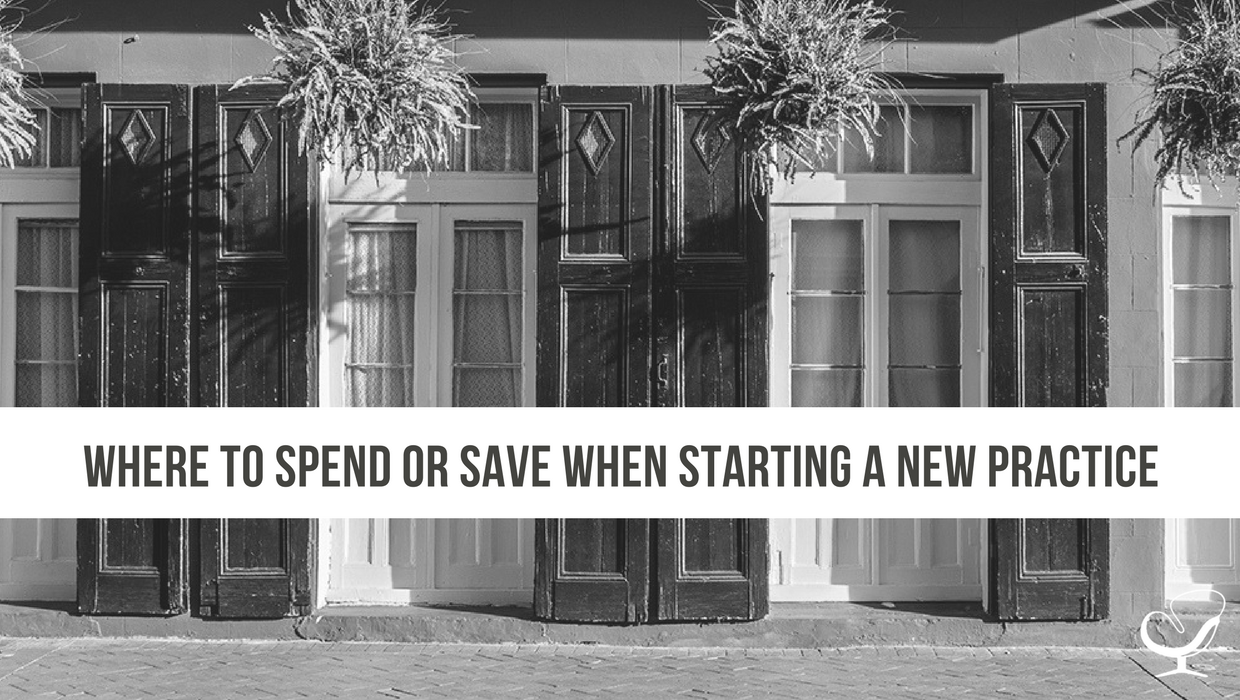Starting out in private practice, there are many things to consider. Most of which mental health practitioners did not learn when in graduate school. From running business financials to marketing a new business, there are tons of ways we can drain our pocketbooks. It’s great to have a vision for your practice’s future, but equally as important to be financially smart. Starting up a business can cost a lot upfront, so making the most of your time and money is essential.
If you’re bootstrapping it to start your private practice, below is a list of ways to be smart and savvy with money.
Where to Invest
An Accountant
Incorporating your business can offer some protection for you, personally and professionally. Some accountants recommend this from starting out, while others do not. Setting up your business structure successfully is an investment well worth your time. Before jumping into private practice, consult with an accountant who understands your business and structures in your area. It’s money well-spent.
EHR System
Having a system for electronic health records instantly levels up your beginning practice. Not only does it help you to stay HIPAA-compliant but helps you keep the clutter down in your office. I personally use a client portal system through Simple Practice. I consider it one of my best startup decisions. Through this EHR system, I am able to keep up with changes in our field, schedule clients, run invoices, and take payment. For a starting business, this adds professionalism from day one. When your business runs smoothly, it gives your clients even more confidence that they are in good, capable hands.
Computer / Phone
The majority of clinicians run their businesses from their cell phone and laptop computers. That makes these two pieces of technology essentially important. Invest in a good, lightweight computer that will support you and how you set up your business. For me, that means having a system that I can easily log on to the internet, so that I can manage schedules, billing, and notes in the EHR system that I use. Since phone calls are the primary way that potential clients will contact most clinicians, having a good phone for that purpose is also important. And, bonus, you can write these off as business expenses at the end of the year.
Where to Save
Website and Marketing
Yes, many Private Practice owners have their own fancy website and marketing strategy. Don’t get me wrong, I think this is smart and should be your goal. But, fancy websites, shiny glossy brochures, business cards, and trinkets add up quick! You can save a ton of money on marketing and website costs by using the free platforms in social media. LinkedIn, for instance, offers a place where you can blog and connect with other mental health professionals. Facebook is likely where many of your potential clients are already hanging out. Create a business page with information about you, your practice, and your contact information. Create posts, video, and images to promote and attract the types of clients you’d like to help. Trust me, if you invest time and energy here, word will spread!
Office Space
The idea of having your very own office space is oh-so-attractive for most clinicians. In the start-up phase, while you are building your caseload, however, it can be a much smarter option to share an office space. Look on local listservs. Lots of folks are seeking the same thing. It’s possible to share space with someone in a different field, but it can be really helpful to find someone who’s also in mental health. You’ll save a ton and it’s awesome to have someone to talk to in the same field.
Continuing Education
I’m a total geek when it comes to learning, learning, learning! I LOVE spending my hard earned money to teach me more! Unfortunately, training can also cost a lot of moolah! Save money and be smart by putting those pricey trainings on hold (for now). Get connected with local mental health agencies. Many behavioral hospitals, IOP programs, or other community resources will offer free monthly CEUS to therapists. Take advantage of this opportunity! You’ll save a ton, stay on top of your game in the field, and get connected with other professionals, which can open doors for you in the future.
Starting a private practice is exciting, creative, challenging, and scary all rolled into one. Being smart with your money at the bootstrapping start-up stage can lay a great foundation for building a business that will be sustainable and grow over time. It takes initiative, work and faith, but the reward is worth it!
Wishing you all the best!
 Jenna Fleming, M.Ed, LPC, NCC is owner and clinician at Georgetown Child & Family Counseling, located in the beautiful hill country of Texas. Her practice and work specializes in children, teens, young adults, and parents. Jenna is author of the Deeply Rooted Parenting program. She writes and speaks on topics for parents, educators, and counselors. When not engaged in her work, you’ll likely catch her being silly with her husband and two kids, practicing yoga, or enjoying delicious Tex-Mex.
Jenna Fleming, M.Ed, LPC, NCC is owner and clinician at Georgetown Child & Family Counseling, located in the beautiful hill country of Texas. Her practice and work specializes in children, teens, young adults, and parents. Jenna is author of the Deeply Rooted Parenting program. She writes and speaks on topics for parents, educators, and counselors. When not engaged in her work, you’ll likely catch her being silly with her husband and two kids, practicing yoga, or enjoying delicious Tex-Mex.

